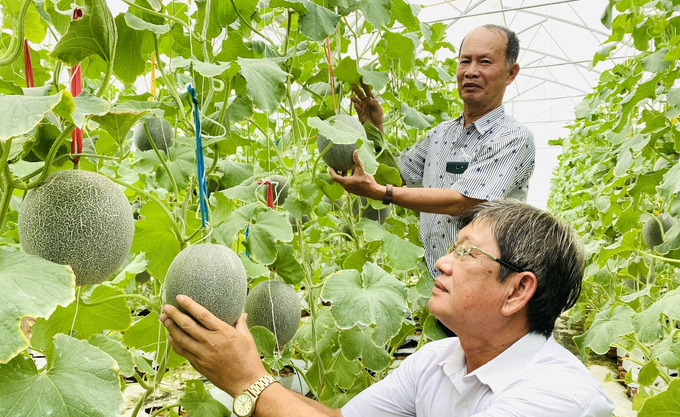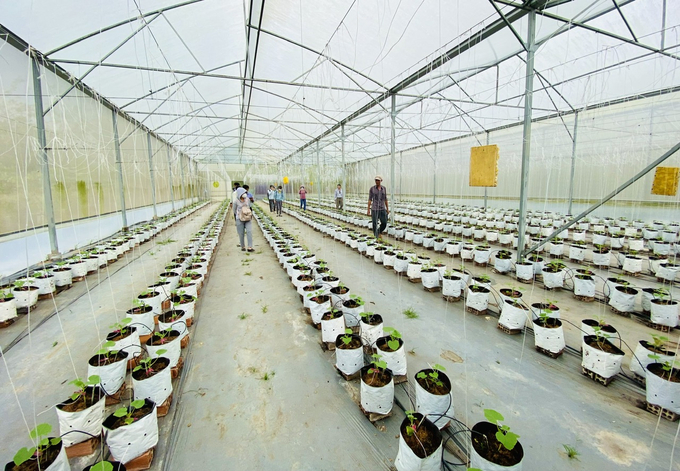November 26, 2025 | 16:59 GMT +7
November 26, 2025 | 16:59 GMT +7
Hotline: 0913.378.918
November 26, 2025 | 16:59 GMT +7
Hotline: 0913.378.918

Open agriculture means open to human resources training. Photo: Le Hoang Vu.
We identify two target groups to improve the quality of agricultural human resources. The first is a group of senior researchers and lecturers in the agricultural industry. The second is the subjects directly engaged in production and business, such as farmer households, farms, cooperatives, and small businesses.
Vietnamese agriculture is in a transition period to build ecological agriculture, vibrant countryside, and innovative farmers.
Implementing the "Strategy for Sustainable Agriculture and Rural Development for the 2021-2030 period - Vision for 2050" requires knowledge and agricultural skills, and therefore many new issues related to human resources.
Therefore, the role of human resource training and reforming the agricultural extension system to bring the best scientific, technological, and business management information to farmers, cooperatives, and businesses is critical.
For the first group of subjects, senior research and teaching groups need to promote the role of intellectuals in schools and research institutes related to the agricultural industry. The reality of "brain drain" frequently occurs in research institutes and universities, thus require close cooperation between units to train human resources in line with the content of agriculture transformation.
We must acknowledge that there are still many resource constraints, but we still need a clear strategy. Some solutions include expanding international relations for integration actively, updating and receiving knowledge of agricultural production and business, and adapting to climate change and environmental issues.
Our current agriculture is open agriculture, so for sustainable development, it is necessary to determine that even in training, it must be open. The solution is to promote international cooperation to integrate and capture the latest international technical advances and innovations. The National Action Plan to transform Vietnam's transparent, responsible, and sustainable food system by 2030 has these contents.
As for the second group, which is people directly engaged in production and business, such as farmers, farms, cooperatives, and small businesses, the problem is about how scientific and technological research results should be transferred to the subjects who need the support of this research and teaching system.

High-quality human resources are significant to the agricultural development strategy. Photo: Le Hoang Vu.
At the Vietnam Academy of Agricultural Sciences (VAAS) and its affiliates, we are reforming the research and transfer system by establishing research, consulting, and technology transfer service agencies following the value chain. This is the difference, instead of separating by each stage as before. We study the circular economy agricultural models, multi-value integrated agriculture. The research departments of VAAS are willing to cooperate with localities and agricultural extension centers to transfer synchronous models to farmers, farms, cooperatives, and businesses.
For example, VAAS is currently collaborating with the Australian Embassy to deploy the Innovation Club model of the fruit and vegetable industry. This is a potential industry with high growth in both production and export recently. Additionally, the demand of farmers, cooperatives, and businesses for technological innovation is great. One of the action programs of the Innovation Club is to build a list of experts in all stages of the fruit and vegetable value chain.
Through online forms and social networks, these experts can answer all the problems that farmers, farms, cooperatives, and businesses have needs. Simultaneously, we also transfer synchronous models from varieties and farming techniques to marketing and tourism combined with models to achieve efficiency, sustainable development, and multi-value integration.
It is a combination of those possessing agricultural knowledge with those who need support, and we expect that in the coming period, when the agriculture and rural development sector focuses on strengthening the capacity of Cooperatives, The Innovation Club model will undoubtedly be even more effective.
Through the Innovation Club model, ten million farmer households will connect with multi-functional transfer centers and cooperate with leaders of agricultural cooperatives to transfer. In the Innovation Club, the source of technology is not only the results of the research institutes but also the collection of the best technologies and management experiences in the country, internationally, and in the private sector to summarize and share with the community.
"Open Agriculture" is the name an open-access journal that publishes original articles reflecting the latest achievements in agroecology, soil science, plant science, horticulture, forestry, wood technology, zootechnics and veterinary medicine, entomology, aquaculture, hydrology, food science, agricultural economics, agricultural engineering, climate-based agriculture, amelioration, social sciences in agriculture, smart farming technologies, farm management.
Translated by Ha Phuc

(VAN) The model of making a living under the forest canopy through the agroforestry system in Van Son commune, Bac Ninh province, is expected to generate an annual income of approximately VND 30 million/ha.

(VAN) Many enterprises in Can Tho are harnessing natural energy and reducing greenhouse gas emissions in their production processes, thereby contributing to the promotion of a sustainable green transition.
/2025/11/24/3536-2-112800_176.jpg)
(VAN) Dong Nai now has tens of thousands of hectares of forests certified for sustainable management, and this area will continue to be expanded in the coming period.

(VAN) Vinh Ha hamlet (Dai Xuyen commune, Hanoi) is shifting away from small-scale farming as households adopt bioscurity into their breeder chicken models.

(VAN) Heavy rains make aquatic species more vulnerable to disease. Proactive water management and high-tech systems help farmers prevent outbreaks and protect yields.

(VAN) Greenhouses are shifting production mindsets in Binh Lu commune, enabling farmers to ‘weather the sun and rain’ and secure stable vegetable harvests throughout the year.

(VAN) Green transition is crucial for the Mekong Delta amid climate change and stricter standards, offering a path toward sustainability.